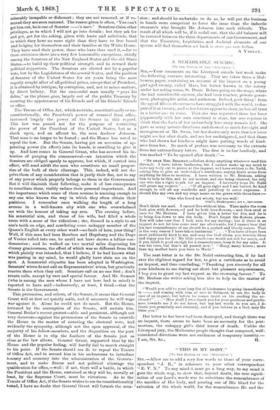A REMARKABLE SUICIDE.
ITO THE EDITOR OF TOE "SPEVTATOR:1 Sin,—Your comments on the Liverpool suicide last week make the following extracts interesting. They are taken from a Melbourne paper, containing an account of the inquest on a young girl aged twenty, called Mites, but better known in the colony under her acting name, St. Denis. Before going on the stage, where she had considerable success, she had been teacher, private governess, photographic artist, and authoress. Indeed, poor thing from the age of fifteen she seems to have struggled with the world, to despair of it at twenty, and as her letters appear to show, to lose all trust in a better one to come. That she was separated front her lover (apparently with her own sanction) is clear, but one rejoices to think that the facts of her melancholy love story remain hid. She gave as many minute directions and showed as much foresight and management as Mr. Swan, but her desires only were that her lover might see her after death, and see her uudisfigured, and that those who had shown her kindness might have parting words of kindness from her. So much of preface was necessary to the extracts from her extraordinary letters. The first is to her landlady, and was marked "To be opened after death :"— "MT DEAR Mas. BELLMAN,—Before doing anything whatever read this through. I have taken laudanum, but I cannot mako up my mind to have my body cut to pieces at the inquest, so I have written to Dr. Neild, asking him to give an undertaker's certificate, saying death arose from anything be likes to mention. I have written to Mr. Braham, asking him to help in this, and to my mother, and sho being silenced, the only one who has a right to ask for an inquest. I fervently hope Dr. Neild will grant my request." . . . "If all goes right and I tun buried, be kind enough to sell all my wardrobe and jewellery to cover expenses. I should like my own and my stage name on the grave with those lines:— 'One who loved not wisely, but too well.' Othello, Shakespeare, act v., last Keene.
Don't think me mad. I cannot live without him. Then make the room look nice with flowers,—I and ho both love flowers,—and then send at once for Mr. Braham. I have given him a letter for him, and he is to bring him down to see the body. Don't forget the flowers, please. You will take care that I look nice for my darling; but if there is an inquest do not let him come near me afterwards, for I cannot boar that his last remembrance of me should bo a gashed and bloody corpse. That is the very reason I have taken laudanum." . . . " You have always boon most judiciously kind to me, and may the God whom you worship bless and repay you for it ! My little pencil-case would not sell for much, and if you think it good enough for a remembrance, keep it for my sake. It was his once, but that's all passed now." "Many, many kisses ; more than my mother have you been to Marie."
The next letter is to the Dr. Neild entreating him, if ho had ever the slightest regard for her, to give a certificate as to avoid an inquest, and thus concluding, "Thanking you sincerely for all your kindness to me during our abort but pleasant acquaintance, I beg you to grant my last request as the crowning favour." To Mr. Braham she writes asking him also to help in the matter of the inquest.
"Would you add to your long list of kindnesses hy going immediately to —, and coming with him at once to Solimont. to see tho body in case of an inquest, but before he comes insist on his reading the enclosed ?" . . . " How shall I over thank you for your goodness and gentleness towards me I do not know, but my last words to you are, I do thank you gratefully and sincerely, and if you believe in a God, may He bless you !"
Her letter to her lover had been destroyed, and though there was an inquest, there seems to have been no necessity for the postmortem, the unhappy girl's chief terror of death. Unlike the Liverpool jury, the Melbourne people thought that composed, wellconsidered directions were not evidences of temporary insanity.— I am, Sir, &c., H.


































 Previous page
Previous page